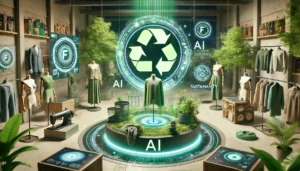A new industry report reveals that artificial intelligence (AI) is increasingly being used to enhance textile recycling, offering solutions to one of fashion’s most persistent sustainability challenges. The technology is helping to improve the efficiency of sorting processes, enabling higher rates of material recovery and reducing waste across the textile supply chain.
Advanced AI Sorting Systems
The report highlights the deployment of advanced sorting systems, including compact near-infrared (NIR) scanners and AI-driven fiber detection tools. These systems can rapidly identify and classify different fabric types, even in mixed-material garments, a task traditionally labor-intensive and error-prone. By automating these processes, recyclers can handle larger volumes of textiles with greater accuracy.
Separating Natural and Synthetic Fibers
AI technologies assist in separating blends of natural and synthetic fibers, a critical step for creating high-quality recycled materials suitable for new textile production. This precision allows companies to reclaim fibers that might otherwise be discarded, reducing environmental impact and promoting circular fashion initiatives.
Scaling Up and Industry Collaboration
Industry experts note that scaling up AI-powered sorting could significantly enhance the global textile recycling industry. Current recycling methods recover only a small fraction of post-consumer textiles, with much ending up in landfills or incineration. The report emphasizes that collaboration between fashion brands, recyclers, and tech providers is key to creating effective, circular supply chains.
Pilot Programs and Results
Several pilot programs have demonstrated AI’s potential in textile recycling. Facilities using compact NIR scanners combined with machine learning algorithms report dramatic increases in sorting speed and accuracy, allowing more materials to be diverted from waste streams and re-enter production cycles.
AI as a Complement to Human Expertise
The report concludes that AI is not a replacement for human expertise but a complement, enabling more efficient, scalable, and environmentally responsible textile recycling. As the fashion industry faces mounting pressure to reduce its ecological footprint, AI-driven sorting technologies could become a cornerstone of sustainable production and circular fashion practices worldwide.

